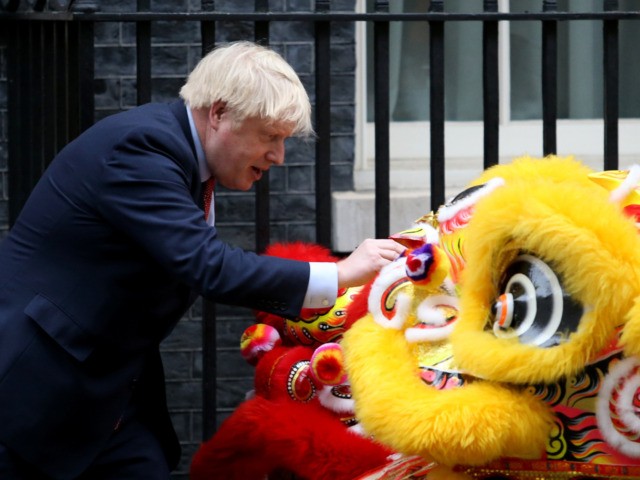A top civil servant at the Foreign Office has said that the British government has made a “firm decision” on allowing Chinese tech giant Huawei to help build the United Kingdom’s 5G network, and the arrangement will not be reconsidered.
Asked whether he would advise Secretary of State for Foreign and Commonwealth Affairs, Dominic Raab, to reevaluate the UK’s position, Sir Simon McDonald, the Foreign Office’s permanent undersecretary, told MPs at the foreign affairs select committee on Tuesday: “As you know… the government decided to proceed with an investment but with very strict conditions… As far as I know that… is a firm decision and is not being reopened.”
“China is a very important partner of the United Kingdom, and I think it’s compatible to proceed with the Huawei decision and have the strategically independent relationship that I have been talking about,” Sir Simon added in comments reported by Reuters.
In January, Prime Minister Boris Johnson signed off on the involvement of Huawei in the future development of the country’s 5G data networks. Despite the government saying that the Chinese company would be working on non-essential parts of the system — capping its involvement at 35 per cent — ministers and Anglosphere allies have warned that participation by the Chinese company could cause a security risk.
Huawei is widely held to be controlled by the communist Chinese state and reportedly used by Beijing for spying. The United States has warned that Huawei has “back door” access inbuilt into its networks, causing concern that the Chinese Communist Party (CCP) could use Huawei technology in the UK’s 5G network to secretly access sensitive and personal information.
Farage: Huawei in UK 5G May Be Price for Accepting China’s Coronavirus Aid https://t.co/mCgrCfsoj7
— Breitbart London (@BreitbartLondon) April 7, 2020
In immediate response to Mr Johnson’s decision, U.S. Secretary of State Mike Pompeo flew over to the United Kingdom to discuss the controversial move. While Mr Pompeo assured the prime minister that the Huawei decision would not affect U.S.-UK relations and that Britain remains at the “front of the line” for a post-Brexit trade deal, later reports circulated claimed that Johnson’s decision had caused fractures with key Anglosphere intelligent sharing partners, the Five Eyes. President Trump had allegedly “slammed” the phone down on Boris Johnson in a row over the Chinese tech firm, and Australian MPs had cancelled a visit to the UK.
The move also proved unpopular domestically. In February, former Conservative Party leadership candidate and Brexiteer David Davis branded it the government’s “worst intelligence decision” since MI6’s recruitment of traitor and Soviet Cold War asset Kim Philby. While in February, a group of former Cabinet ministers, including Sir Iain Duncan Smith, said that Huawei’s involvement in British telecommunications networks made as much sense as involving Nazi Germany in radar technology development in early 1939.
Dissatisfaction over the Prime Minister’s decision resulted in 36 Tory MPs rebelling in a Commons vote on an amendment to a telecommunications bill in early February. The rebellion is unlikely to have cooled in the intervening month, particularly in light of the Chinese coronavirus crisis during which credible claims have come to light that the CCP withheld vital information about the Wuhan virus from the rest of the world in the early weeks of the outbreak.
Senior Tories Accuse Chinese Interests of Exploiting Coronavirus Crisis to Dominate UK Tech https://t.co/VyI8f6dM6E
— Breitbart London (@BreitbartLondon) April 15, 2020
Despite the Foreign Office’s permanent undersecretary saying that the government will not reconsider its decision, government insiders speaking to Bloomberg last week believe that Conservative MPs’ positions are hardening against the Chinese firm and that it may be difficult to pass legislation permitting Huawei access to Britain’s 5G network.
It is not just British MPs and international Anglosphere allies pressing Britain to reconsider its decision. Tech companies are also urging the UK to find 5G alternatives to Huawei. In a letter seen by Axios and reported on Monday, firms including Japan’s NEC wrote to the House of Commons defence committee chairman Tobias Elwood asking the government to ditch its plan to allow “high-risk vendors” access to the UK’s sensitive telecommunications network, saying it is possible to “put in place the most technologically advanced 5G infrastructure” without the Chinese company.
Brexit Party leader Nigel Farage said of Huawei earlier this year: “Once Huawei is in the 5G network, getting it out will be all but impossible. For this reason, Johnson must reverse his decision to allow Huawei to take such a big position in creating 5G. A full-scale rebellion within Britain’s ruling Conservative Party is the only way he can be guaranteed to change his mind.”
“We didn’t free Britain from Brussels only to bow before Beijing,” he said.
Farage: Huawei Decision Threatens Five Eyes, Trade, Even Future of NATO https://t.co/HPdvbT7XXS
— Breitbart London (@BreitbartLondon) February 19, 2020

COMMENTS
Please let us know if you're having issues with commenting.